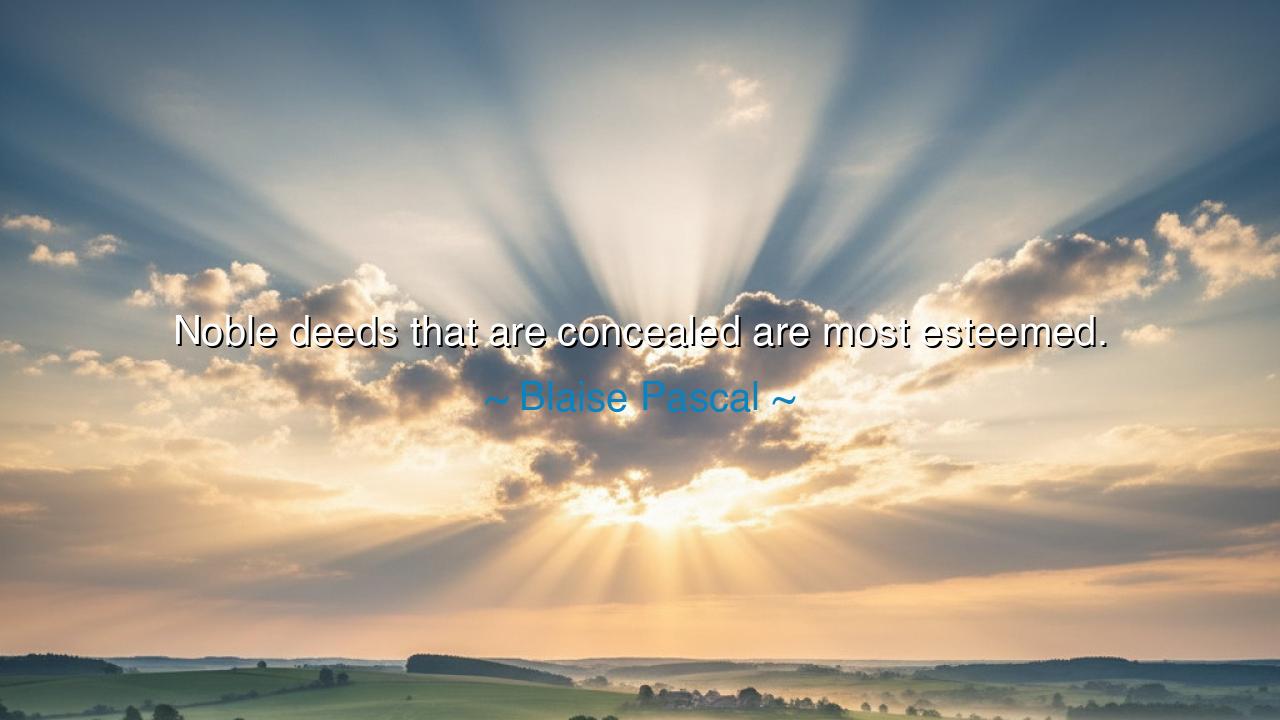
Noble deeds that are concealed are most esteemed.






“Noble deeds that are concealed are most esteemed.”
So wrote Blaise Pascal, the mathematician, philosopher, and man of faith whose soul was as profound as the heavens he studied. In this saying, he revealed a truth older than time — that true nobility does not seek witness nor reward. The noblest deed is that which is born of pure intention, performed in silence, and left to the unseen judgment of eternity. For when the world’s eyes are turned away, and the heart still chooses goodness, then goodness is most pure — and most divine.
Pascal lived in a century when intellect and faith were at war within the human spirit. He was a man of brilliance and renown, yet his writings, his prayers, and his charity often moved in secret channels, unseen by the proud or the powerful. To him, concealment was not cowardice, but humility — a sacred veil that preserves the beauty of virtue from the corruption of vanity. He knew that once a deed is displayed for praise, it becomes half its worth; for it begins to serve the ego rather than the truth. Thus, the concealed act of goodness is like a seed buried in the earth — unseen, yet destined to yield a hundredfold.
Throughout history, the greatest souls have understood this law of the heart. Think of Florence Nightingale, who tended to the dying in the shadows of the Crimean night. Her lamp, flickering through tents of suffering, was never meant for fame. She sought not recognition but mercy. And yet, because her heart sought no applause, her legacy became immortal. The very concealment of her purpose magnified its light. So it is with all who act from love alone: the quieter their service, the louder their echo in eternity.
The world, however, tempts us otherwise. It urges us to trumpet our virtue, to proclaim our charity, to display our generosity. Yet the wise know that virtue loses fragrance when exposed to the air of praise. Like incense, it burns best in the temple of silence. The man who helps the poor for show, or forgives for admiration, is but an actor upon the stage of vanity. But he who does good unseen is a craftsman in the workshop of heaven. His name may be forgotten by men, but it is inscribed in the heart of God.
To conceal one’s noble deeds is an act of courage in itself. It demands strength to walk the path of righteousness without witness, to give without thanks, to love without return. It is easy to act when others applaud, but the pure soul acts even when unseen, knowing that virtue is its own reward. There is a quiet heroism in every mother who sacrifices for her child without boasting, in every worker who labors honestly though none take note, in every stranger who helps another and fades away. These are the unseen saints of the earth — pillars that uphold the world though the world never names them.
Pascal’s words are thus both a warning and a blessing. They remind us that the measure of goodness is not in its recognition, but in its sincerity. The deed that hides itself from pride becomes radiant before truth. The life that gives without counting gains the richest treasure of all: the peace of the soul. For what glory is greater than to live rightly, even when no one sees? What crown is higher than to serve unseen and be content that heaven alone bears witness?
So let this be your lesson, child of light: do good in silence. Let your right hand not know what your left hand gives. Seek not the gaze of men, but the stillness of conscience. Help the weak quietly, forgive without announcement, love without demanding to be loved. Conceal your virtue as a pearl within your heart, and it will shine all the brighter in the eyes of the Eternal. For noble deeds that are concealed are most esteemed, and the truest greatness is that which hides itself in humility.
And remember this: when all the noise of fame and flattery has faded into dust, it is the quiet acts — the whispered kindness, the secret mercy, the silent forgiveness — that will outlive the stars.






AAdministratorAdministrator
Welcome, honored guests. Please leave a comment, we will respond soon